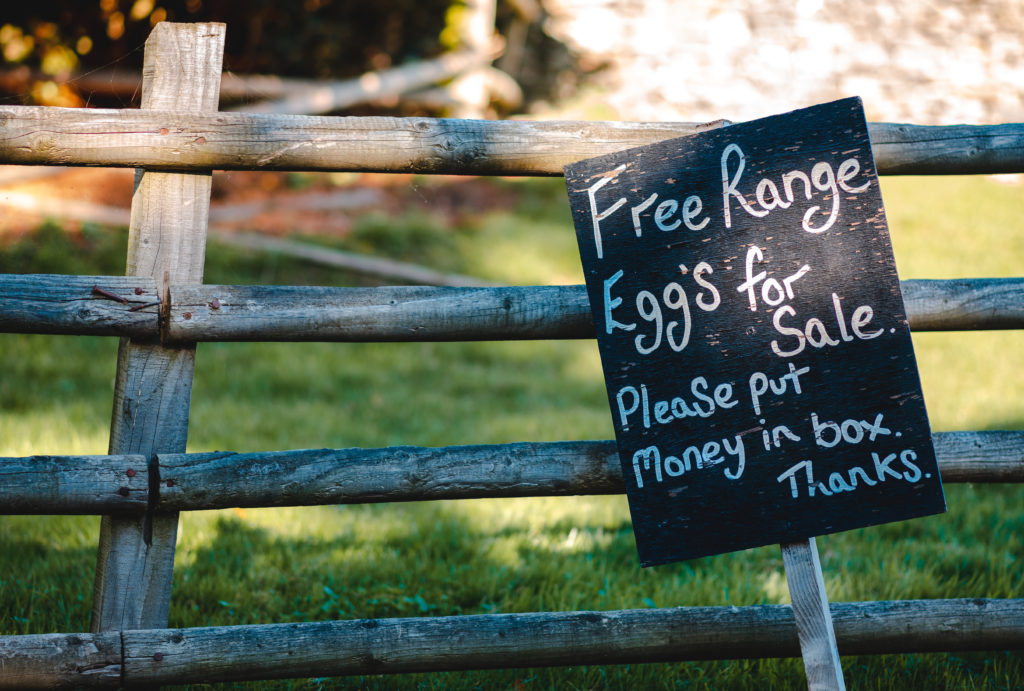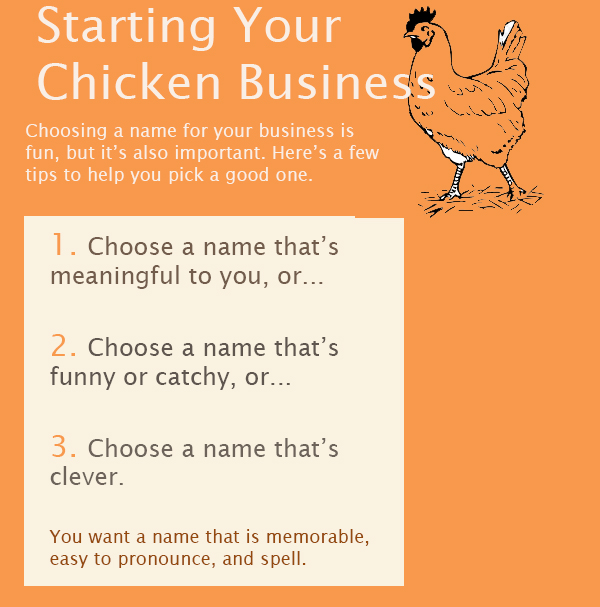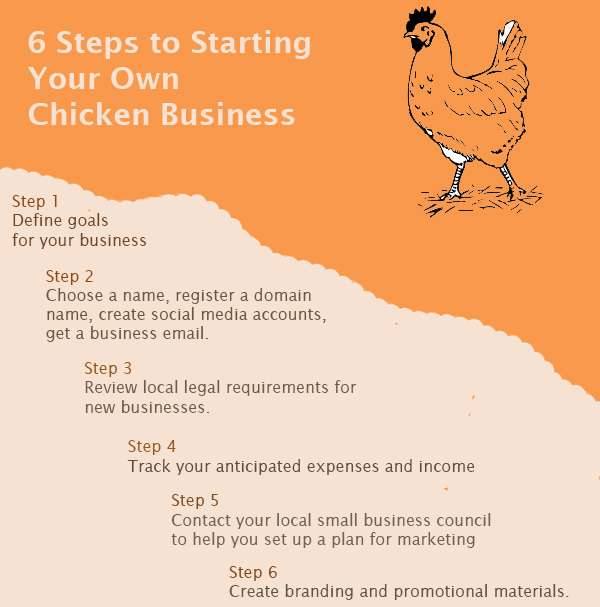Want to start a chicken business? Liz Fulghum has fantastic suggestions to help you get set up.
Keeping chickens can easily turn into a rather addictive hobby. If you have the space for it, it’s usually not long before a small flock turns into a larger flock. After all, it’s hard to resist the cute faces of peeping chicks, or the draw of adding a few Easter Eggers to your flock, or the thrill of breeding some rarer varieties. And if your hobby is expanding and you’re considering turning it into a business—maybe selling eggs, rare day-old chicks, or pullets—then this guide is for you. Here are all the things you need to consider for the business side of your new venture.

Decide on goals
You don’t need to have all the answers when you start your new business. Things will evolve in ways you can’t even imagine over time. You also don’t have to build out an official business plan for your new business, although you can if you want to. But it’s helpful to take some time to wrangle all your big lofty business dreams into a rough structure and answer some big picture questions.
Thinking about and answering these questions today will help guide your business development activities and help you make the right decisions when opportunities and challenges arise. Here’s the short list:
- How does your business stand out from the competition?
Define your unique value proposition; what makes your products stand out? Answering this question will help you develop marketing material and talk to your customers about why they should purchase from you.
- Who are your competitors?
Taking the time to thoroughly investigate your competitors will yield valuable information and help you make decisions about your business: where are they marketing? How much are they charging? What are they doing that is really working? What isn’t?
- Who’s your customer?
Are you selling eggs to people who are obsessed with local, organically grown food? Selling rare breed chickens to enthusiasts? Figuring out who your customers are will help you decide where and how to sell your products and what things are important to them.
- How much money do you need to get started?
Every startup needs a budget, even if it’s $100. Look at all your costs associated with your business and make sure you have the savings ready to hit the ground running.
- What are your business and revenue goals for the first, second, and third years?
It’s impossible to measure success unless you have a yardstick. By creating realistic, conservative projections for your first three years of business you can easily see if you are succeeding or falling short. Revisit these regularly to check in with the health of your fledgling business.
Choose a Business Name and Register the Domain Name, Socials, and email address
Choosing a name for your business is a lot of fun, but it’s also an important choice. Chances are, you won’t wind up changing it later, so it’s important that it’s a good name. You can choose something meaningful to you, something catchy and funny, or something clever, but it should be something that’s easy to remember, pronounce and spell.

When you’re deciding, make sure a domain name / URL is available for the name. Whether you plan on having a website now, or sometime in the future, you want to make sure that you have reserved the domain name when you start your business.
You can check to see if your business name is available at GoDaddy and also register it there (look around for coupons, there are always good deals available). If the exact name isn’t available, think of some variations, like adding “farms” to the end of the name or “eggs”. If at all possible, make sure you get a domain name with the .com extension. This is more common than .net, .org or any of the other more unique domain name extensions and will be easier to remember for people.
You’ll also want to register an email address to use for business correspondence. Sending from a business email is more professional than using your personal email, reinforces your company brand, and gives you separation between your business and personal emails. You can register one at GMail for free that ends in @gmail.com, or for $5 a month, you can get Google for Business which allows you to use your domain name and set up an email address such as: fresheggs@yourdomain.com.
Finally, make sure when you register that you set up profiles for your business on all the major social media networks using your new email address, including Instagram, Facebook, Twitter, and Pinterest. Even if you don’t plan to do anything with these initially, you’ll still have them reserved for later so nobody else can take them.
Review Local Guidelines Around Legal Requirements for Starting a Business
Most cities and states have very light requirements for small businesses that are just getting started, especially if revenues fall below a certain threshold and / or you’re running your business as a Sole Proprietorship. Understanding what permits and licenses you may need is important to make sure you are starting off on the right side of the law. Keep in mind that if you plan to open a separate bank account for your business, many banks will require that you have registered for an employer identification number (EIN) and filed local business registration forms, so check with them before setting up an appointment.
If you plan to sell at local farmers markets, carefully review their booth rental guidelines. Most farmers markets require the business to be registered and carry liability insurance. These costs add on to the basic fees associated with renting the space and may not be worth the expense when you’re just starting out.
If you’re selling eggs, you’ll need to review any relevant state and federal laws that apply to cleaning and packaging your eggs. Most states have exemptions for small producers, but it’s wise to check with your local agricultural resources.
Create Branding and Promotional Materials
If you plan to sell to markets beyond your friends and family, you’ll need present a professional face to your company. Looking and acting professional in your business dealings helps establish trust with customers before they’ve had an opportunity to purchase from you.

First, you’ll want to create a logo to represent your business. Fiverr is an excellent place to work with graphic designers who can take your vision from idea to reality. As you’re designing your logo, keep in mind that it should be simple enough to be recognizable in both large sizes and small sizes, as well as clear enough and easy to read both in color and black and white. Ensure you get vector versions of your logo (ai, .eps) so that you’ll have them in a format that works online and in print and can be scaled to any size.
You should also invest in a small batch of business cards to hand out when you’re talking to potential customers, and consider some post cards or flyers featuring your products. If you want to start out with a website right away, you can look at services like Wix or Squarespace to build out a simple online presence for your business.
Create a Marketing Plan
When you start your business, you’ll need to get the word out about your products. Your strategy for doing this constitutes your marketing plan. Your plan might include a website; advertisement posts in local neighborhood Facebook groups; or promoting a small farmers market booth by creating a partnership. Brainstorming ideas to promote your business early allow you to focus on executing them later on.
Track Your Expenses and Income
Finally, as you start to amass business costs and sell products, remember to track all your expenses and income. This will help come tax time as some of your expenses may be deductible and your income taxable. You can track expenses with something as simple as a spreadsheet, but there are plenty of low-cost options to handle simple bookkeeping like Xero and Wave Accounting. Your accountant will thank you.
Make the Transition from Hobby to Business
Whatever business you’re thinking of starting, most importantly, remember to have fun and take things slowly. Growing organically will keep your new business from feeling like another job. Exploring resources locally like farm business meetups, your local SBA Score Office, and other mentoring organizations can help you build a network of support as your business grows and you run into new challenges.
Liz Fulghum is an entrepreneur and technologist who also has a passion for low-maintenance, productive gardening. Her urban backyard homestead is an oasis from busy days, full of raised vegetable beds, fruit trees and shrubs, bees, and a small flock of chickens. You can follow her on Instagram @lizfulghum.













2 Comments
That’s a really good article. You did excellent job explaining how to start a chicken business.
Liz Fulghum how informative your post about how to start a chicken business I’ve got about
3 years and now Costco has bought the property that I was renting I’m up a creek without a paddle. Maybe somebody could help me with a GoFundMe page and I could get a small piece of property and move all my babies in my mommies and a few boys I have about 200 chickens I’m so hurt anyhow my name is John I live in Stuart Florida and probably have a month and a half left here and I don’t know what I’m going to do have a great day my email is jojomickey67@gmail.com